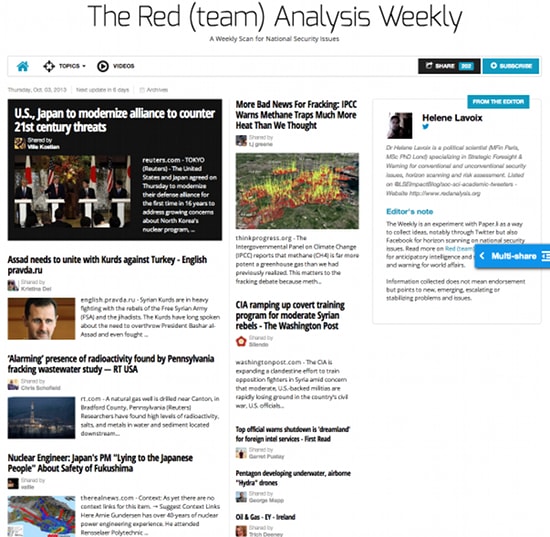Outre d'autres questions, l'accord entre les États-Unis et le Japon visant à moderniser leur coopération en matière de sécurité, impliquant entre autres un rôle plus important pour le Japon, est très susceptible d'avoir des effets d'entraînement, notamment si l'on considère la situation tendue avec la Chine et les blessures régionales non cicatrisées découlant de la Seconde Guerre mondiale. La sécurité énergétique est donc au premier plan, les questions renouvelées concernant l'impact environnemental négatif de la fissuration ayant également un fort potentiel d'impacts importants et multiples, sans oublier l'impact de la tragédie nucléaire de Fukushima.
Cliquez sur l'image ci-dessous pour lire sur Paper.Li

Publié par Dr Helene Lavoix (MSc PhD Lond)
Dr Hélène Lavoix is President and Founder of The Red Team Analysis Society. She holds a doctorate in political studies and a MSc in international politics of Asia (distinction) from the School of Oriental and African Studies (SOAS), University of London, as well as a Master in finance (valedictorian, Grande École, France).
An expert in strategic foresight and early warning, especially for national and international security issues, she combines more than 25 years of experience in international relations and 15 years in strategic foresight and warning. Dr. Lavoix has lived and worked in five countries, conducted missions in 15 others, and trained high-level officers around the world, for example in Singapore and as part of European programs in Tunisia.
She teaches the methodology and practice of strategic foresight and early warning, working in prestigious institutions such as the RSIS in Singapore, SciencesPo-PSIA, or the ESFSI in Tunisia. She regularly publishes on geopolitical issues, uranium security, artificial intelligence, the international order, China’s rise and other international security topics.
Committed to the continuous improvement of foresight and warning methodologies, Dr. Lavoix combines academic expertise and field experience to anticipate the global challenges of tomorrow.
Voir plus d’articles


